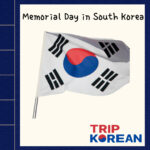Today, I’m going to talk about national holidays in South Korea.
Many of you may not be interested in public holidays in Korea, but the reason I am telling you is that while some public holidays can make your trip more enjoyable when traveling in Korea,
many shops are closed on certain holidays so you cannot fully enjoy your trip.
So, I will introduce all the national holidays in Korea, and introduce some things that may be helpful when traveling in Korea.
Number of national holidays in South Korea
There are a total of 11 national holidays in Korea, and each national holiday is as follows.
- January 1: New Year’s Day
- January 1 (Lunar calendar): New Year
- March 1: Independence Movement Day
- April 8 (Lunar calendar): Buddha’s Birthday
- May 5: Children’s Day
- June 6: Memorial Day
- August 15: Liberation Day
- August 15 (lunar calendar): Chuseok
- October 3: National Foundation Day
- October 9: Hangeul Day
- December 25: Christmas Day
I will tell you the meaning and characteristics of each national holiday.
New Year’s Day
New Year’s Day is January 1st and many offices and companies may be closed.
Not all family members get together on this day, but some people wish family and friends a Happy New Year or get together for a party.
However, most of the New Year’s festivities take place on the Lunar New Year’s Day, which we will introduce just below.
Since public institutions and banks are not open on January 1st, it would be helpful to know if you are traveling to Korea on January 1st.
Lunar New Year
Lunar New Year’s Day is one of the most important holidays in Korea.
This day falls on January 1 of the lunar calendar, and the one day before and after Lunar New Year’s Day is also considered a holiday.
During Lunar New Year’s Day, department stores and markets are packed with shoppers, and almost every road is congested to reunite with family.
Travelers visiting Korea during this time should be aware that many shops and restaurants, including public institutions and banks, are closed.
It is also difficult to book bus and train tickets, especially at this time of year.
So, unless you plan to enjoy the events on Lunar New Year’s Day, avoiding travel during this time is a good idea.
As mentioned above, on Lunar New Year’s Day, places like museum palaces hold events where travelers can experience traditional Korean culture and games.
Independence Movement Day
Independence Movement Day is a day to commemorate the 3.1 Movement of 1919. On March 1, 1919, Korea’s independence from Japan was declared, and this movement was converted into a campaign.
This led to the establishment of the Provisional Government of the Republic of Korea.
On this day, most public institutions and banks are also closed.
Traveling on this day should not be a problem.
Buddha’s Birthday
On the lunar calendar, April 8 is a public holiday to commemorate Buddha’s Birthday.
On this day, many temples in Korea hold festivals and parades.
For those who are interested, it would be a good experience to participate and enjoy the festival together.
Children’s Day
May 5 was first celebrated in 1923 and is literally a day celebrated by children of all ages.
On this day, many places that are popular with children, such as amusement parks, zoos, parks and museums, are crowded with visitors.
Recommended for those planning a trip with children on this day.
Memorial Day, June 6
This day is a day to honor those who died fighting for the Republic of Korea during the Korean War.
Many events are held nationwide, but the largest event is held at the Seoul National Cemetery in Seoul, where the president and key government figures attend.
At 10:00 a.m., a siren sounds for one minute, at which time people bow their heads in silent silence.
Since this is also a public holiday, banks and public institutions are closed.
Liberation Day
August 15, Liberation Day, is the day Korea commemorates Japan’s formal surrender in World War II, ending 35 years of colonial rule over Korea.
Events to commemorate this day are also held nationwide.
Chuseok, August 15
It is one of the most important national holidays along with Lunar New Year, which was introduced at the beginning, also called Hangawi.
Similar to Thanksgiving in the United States, it is usually celebrated with all families gathering and eating traditional foods such as songpyeon.
During Chuseok, many places such as department stores are crowded like New Year’s Day, and highways are also full.
Many shops and restaurants are closed on the day of the Chuseok holiday, but traditional games and various events are held at museums and folk villages, so if you are interested, I recommend you to participate.
National Foundation Day, October 3
National Foundation Day is a day to commemorate the founding of Korea’s first kingdom, Gojoseon. This day is related to Korean history.
Hangeul Day, October 9
Hangeul Day is a day to commemorate the invention and declaration of Hangeul. If you want to know more about Hangul, here is an article I wrote about Hangul.
On this day, competitions and festivals related to Hangeul are held all over the country.
Christmas Day, December 25
Because there are many Christians in Korea, Christmas is also an important holiday.
Christmas is a day to celebrate the birth of Jesus, and Christians go to church on this day to worship, but couples go on dates and families gather together to enjoy parties.
On this day, public institutions and banks are also closed, but shops and restaurants tend not to close.
Wrap Up
Today, we looked at 11 national holidays in South Korea.
Later, if I get a chance, I will post a summary of the location and time of events held on each national holiday.
I hope this article will be helpful to those who are planning a trip to Korea or those who are already traveling.







